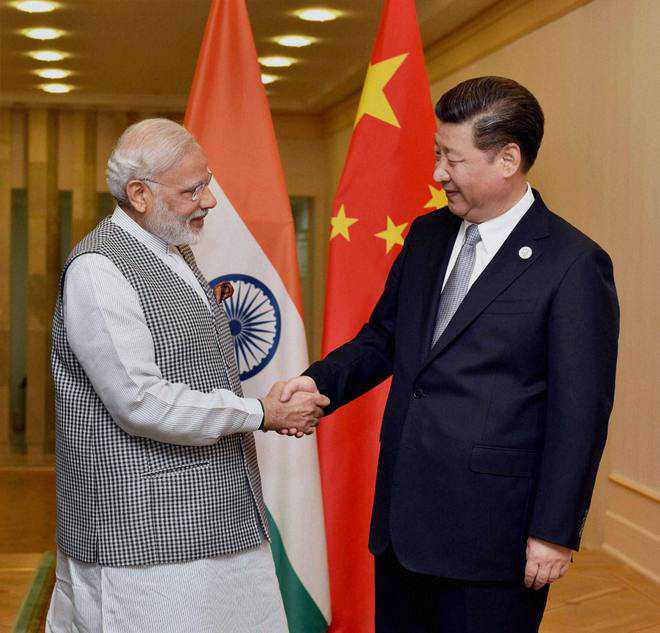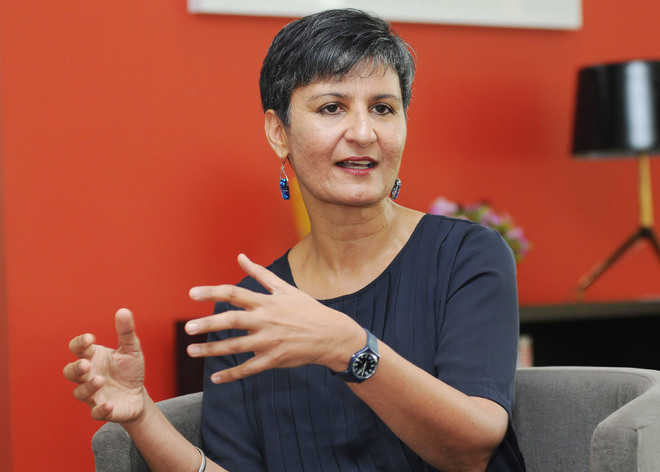
PM Narendra Modi with Chinese President Xi Jinping in Tashkent. PTI
Simran Sodhi
Tribune News Service
New Delhi, June 23
India made the final push for its entry into the Nuclear Suppliers Group (NSG) as Prime Minister Narendra Modi met Chinese President Xi Jinping in Tashkent today. While Modi asked Jinping to “make a fair and objective assessment of India’s application”, the news coming from Seoul, where a special session of the NSG is being held to discuss India’s membership, was not that positive.Apart from China, which has been vocal about its opposition, Brazil, New Zealand, Ireland and Turkey were also not welcoming about India’s induction into the elite nuclear club. Most of these nations have expressed reservations about India not being a signatory to the Non-Proliferation Treaty (NPT). The special session of the NSG, which began post-dinner in Seoul, concluded without reaching any decision on India’s membership. The discussions will continue tomorrow when a final call on India’s candidature can be expected.Meanwhile, Pakistan made sure that it was not left behind in the game for the NSG membership and its President Mamnoon Hussain also met Jinping in Tashkent today. According to a press note issued by the Pakistan foreign ministry, both leaders discussed the issue of Pakistan’s entry into the NSG.Pakistan has been consistently saying if an exception can be made for India, it should also be allowed to join the NSG. Both India and Pakistan have not signed the NPT. Hussain told Jinping that “any exception given for NSG membership could disturb strategic stability in South Asia”.The meeting between Modi and Jinping lasted for about 45 minutes. The Ministry of External Affairs said most of the meeting was devoted to this issue and Modi told Jinping that “China should contribute to the emerging consensus in Seoul”. The Chinese side did not come out with any details of the meeting and made no comments on what had been the response of Jinping to the Modi’s request.Meanwhile, Foreign Secretary S Jaishankar led a team of officials in Seoul, lobbying for India’s candidature. Despite the US, the UK, France and Switzerland backing the India’s bid, the going has been tough for India.While China’s opposition was always known, what might come as a shock to many here is the resistance being put up by smaller countries. India, in a bid to woo many of these nations, had sent senior diplomats of the foreign ministry to these countries so as to address their concerns.For now, the suspense continues as discussion will resume in Seoul tomorrow morning on India’s bid for the NSG membership. The final outcome will then seal the deal for India—one way or the other.
Australia reiterates support on NSG

Harinder Sidhu
Tribune News Service
New Delhi, June 23
Australia today reiterated its strong support to India joining the Nuclear Suppliers Group, maintaining that Canberra feels the NSG should remain open for any country based on merit and willing to go through the process.“Australia has been very, very supportive of India joining the NSG. We think it is an absolutely good thing, we genuinely welcome India’s interests in the NSG and in the other non-proliferation regimes too (Wassenar and Australia group). It demonstrates to us India’s seriousness of intent of being a responsible nuclear actor. And we think India can make a solid contribution to the NSG,” new Australian High Commissioner Harinder Sidhu told The Tribune in an exclusive interview, her first here.Full interview: ‘I always had a strong sense of my Punjabi roots’Asked whether India had reached out to Australia to impress upon New Zealand, which has reservations over New Delhi’s admission to NSG, she said while Canberra has spoken to Wellington about its position, as an independent and sovereign country, New Zealand will make its own decisions.With “both sides of her parents born in Punjab”, the envoy said her focus was to take forward the bilateral relations on a higher plane.Australia, she said, is streamlining the process for Indian students who can apply online for travel permits. The number of students from India studying in Australia crossed the 50,000-mark last year and this year some 70,000 are applying.
